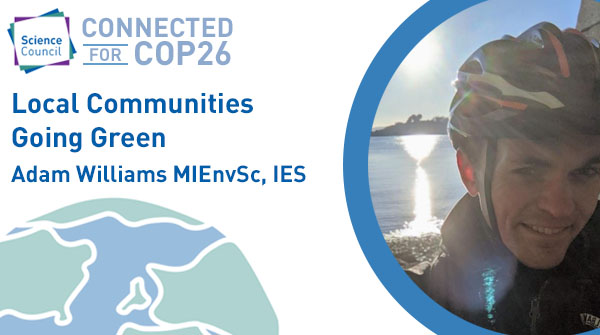
Connected to COP26: Local Communities Going Green
Adam Williams MIEnvSc, Climate Change Specialist on behalf of Institution of Environmental Sciences.
By way of a short introduction, I am the Climate Change Specialist at West Devon Borough Council and South Hams District Council, I’ve been in post since June 2020 and I’m mainly responsible for coordinating both Councils climate emergency response. However, I’m actually an Urban and Rural Planning graduate and my background has been largely spent in Urban and Rural planning specifically in policy, evidence base development and community engagement.
Since declaring a climate emergency in 2019, the two councils have committed to reducing operational emissions to net-zero by 2030 and helping to reduce the district emissions to net-zero by 2050 at the latest, emphasising that reducing district emissions will need to be a concerted effort.
We are also seeking to improve the biodiversity of our own green and wooded public space by 10%.
Since the declaration, this has translated to 3 main areas of focus
- Signing and supporting the Devon Climate Emergency and the production of the Devon Carbon Plan which will then feed in relevant actions to our own Council action plans
- Reducing our operation emissions to net-zero by 2030
- And supporting the District and Borough to net-zero by 2050 by engaging and supporting residents, businesses and partner organisations
It has now been just over a year since I started in this role and we have since developed and adopted a Climate Change and Biodiversity Strategy and Action Plan at both Councils. In terms of the adopted strategy, the Climate Emergency work is beginning to be underpinned by a changing strategic context within the Council since the start of the COVID 19 pandemic which has presented quite a few unique opportunities for a bit of a reset, taking learnings and positives from the pandemic, more remote working, increased connection with nature through explore from your door type activities. But also, it’s given us a chance to consider just how important our communities are and how they’ve all responded admirably to the pandemic, doing wonderful work on the ground.
Just to give a bit of a flavour about what we have done since June 2020, collaboration, partnerships and taking action on some of the low hanging fruit has featured heavily, such as EV charging and securing over £1 million in Green Homes Grants to provide housing retrofit for some of our poorest performing homes. We have also allocated £400,000 of funding to tackle climate change in South Hams which has been split in half, one half to use on reducing operational emissions and the other half to help reduce district emissions and this will be administered as match funding through Crowdfunder to help fund community and business projects. Internally, we have also started to roll out Carbon Literacy training for all senior members of staff to begin to embed thinking around the Climate Emergency into our operation, a full case study on this approach can be found here.
However, as a Council, we only have direct control over a small proportion of the total emissions in each area, around 1.4%, but we also have influence outside of our direct operation. The Climate Change Committee estimates that Local Authorities have powers or influence over roughly a third of emissions in their local areas, whereas around two-thirds of greenhouse gas emissions are related to household consumption according to Climate Outreach. Because of this, we feel our most potent role will be how we work within a leadership landscape, to enable, influence, communicate and develop action that will have the biggest reach and impact across our administrative areas.
In recognition of this, we set up a Climate Change and Biodiversity Community Forum at both Councils. We considered that an officer run Community Forum would be a good way to build networks and create a two-way flow of ideas and action, flipping community engagement slightly, from a primarily front-loaded activity to an ongoing one. It was also because of this we decided to keep our action plan as an organic piece of work to capture new ideas through exchange and learning, sharing concerns and highlighting areas for improvement. We wanted to create a relaxed and open space to discuss these issues. We decided on a fixed membership of around 20 people and seek members through an expression of interest survey, we then applied a set of criteria to ensure we had a good spread of age groups, member location and backgrounds and interests. More detail around this can be found here through a case study by the Local Government Association.
All in all, it’s been a very busy and engaging first year, many other local authorities are recruiting Climate professionals to work on their Climate Emergency Declarations and work by the Climate Change Committee and National Audit Office have started to place recognition on just how important Local Authorities can be as part of the transition to a net-zero future.
